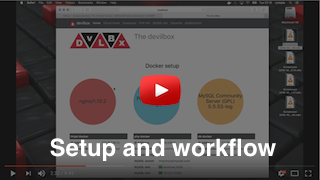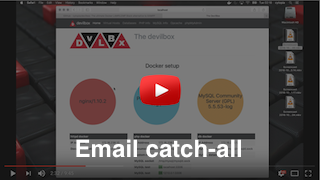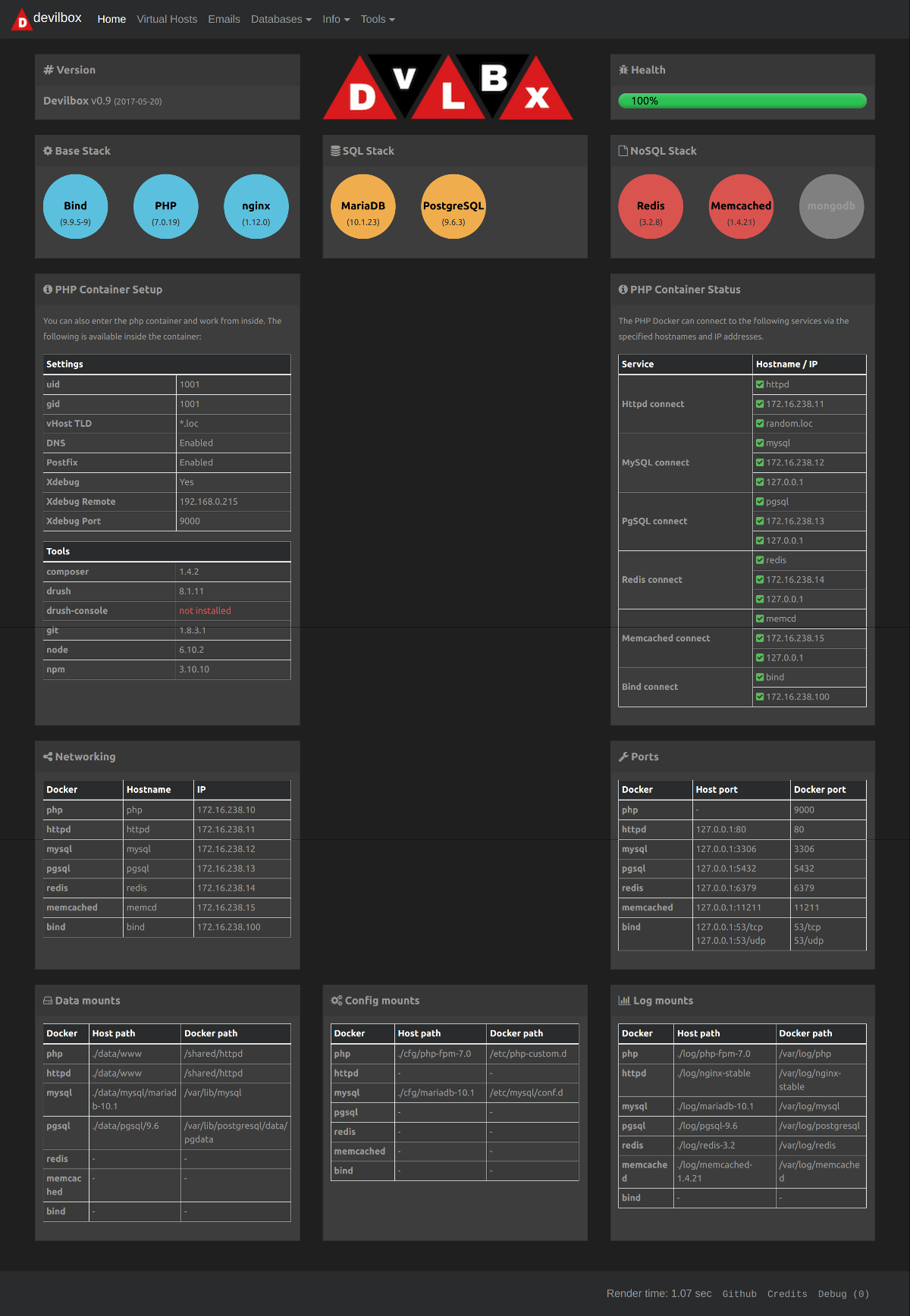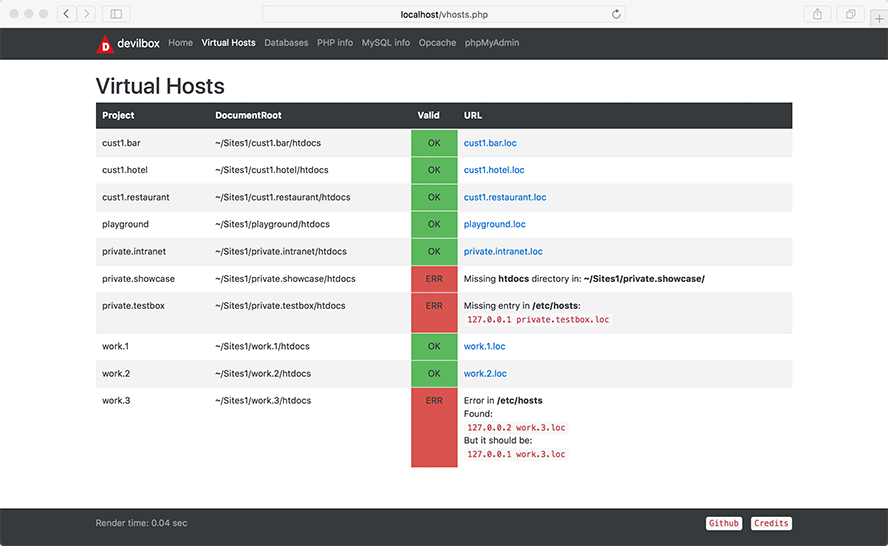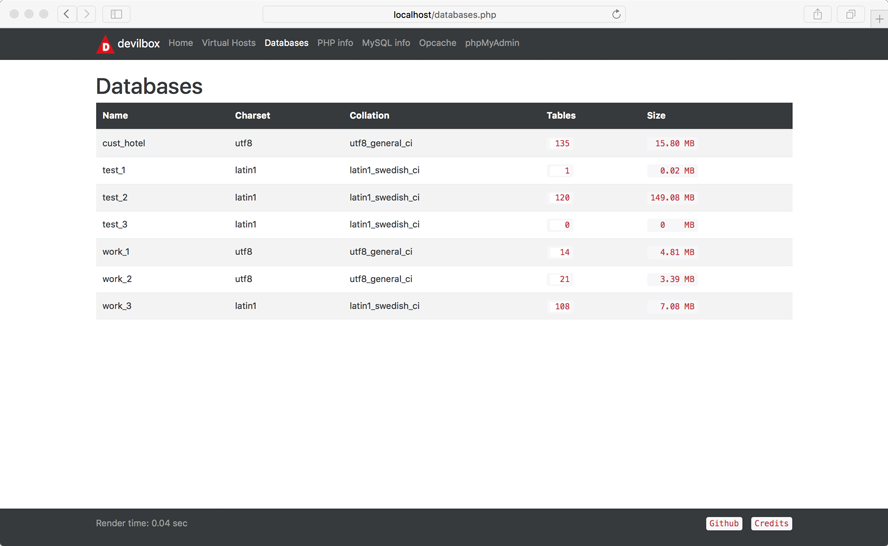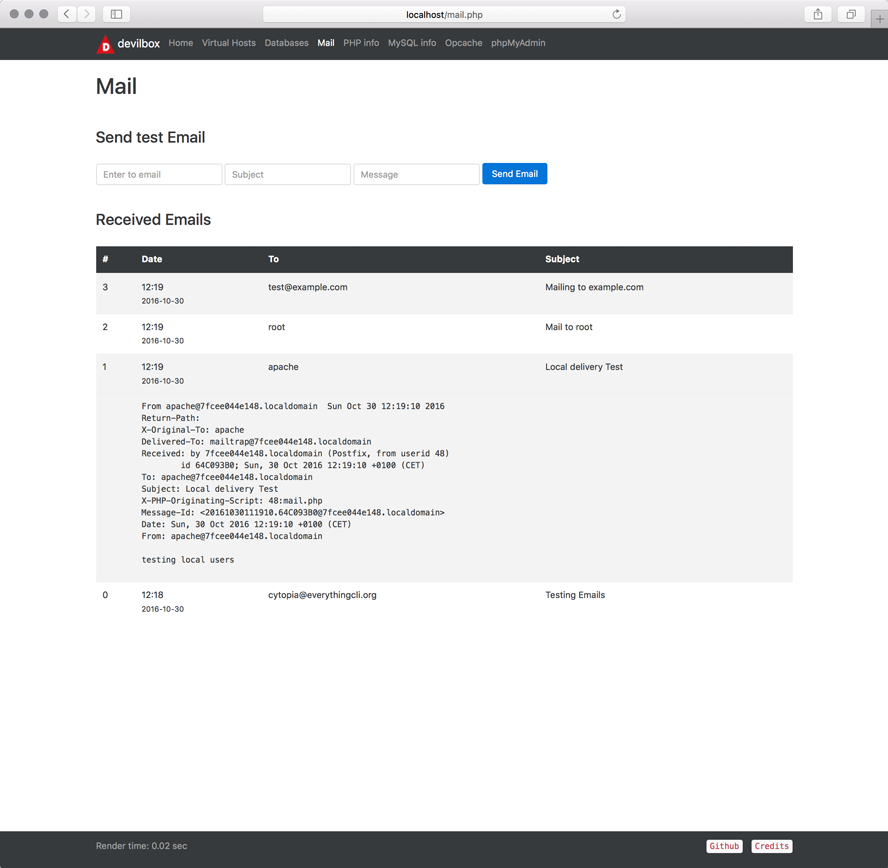 The devilbox
The devilbox
Usage | Features | Documentation | Run-time Matrix | Intranet | Screenshots | License | Contributing |
The devilbox is a modern and highly customizable alternative for XAMPP with a few additional feature on top. It is based on docker-compose with presets for all kinds of versions for webservers, database servers, php and more.
Configuration is not necessary, as everything is pre-setup with mass virtual hosting and auto-dns.
Supported operating systems
It might run on FreeBSD, but I don't know the status of docker-compose there.
Usage
Quick start
You are up and running in three simple steps:
# Create docker-compose environment file
$ cp env-example .env
# Edit your configuration
$ vim .env
# Start all containers
$ docker-compose up
Selective start
The above will start all containers, you can however also just start the containers you actually need. This is achieved by simply specifying them in the docker-compose command. Here are a few examples to get you started.
$ docker-compose up httpd php mysql redis
$ docker-compose up httpd php mysql pgsql redis memcd
$ docker-compose up httpd php pgsql memcd
Run different versions
Every single attachable container comes with many different versions (see runtime-matrix below). In order to select the desired version for a container, simply edit the .env file and uncomment the version of choice.
The following example shows how to set Memcached to version 1.4.28:
$ vim .env
...
#MEMCD_SERVER=1.4.21
#MEMCD_SERVER=1.4.22
#MEMCD_SERVER=1.4.23
#MEMCD_SERVER=1.4.24
#MEMCD_SERVER=1.4.25
#MEMCD_SERVER=1.4.26
#MEMCD_SERVER=1.4.27
MEMCD_SERVER=1.4.28
#MEMCD_SERVER=1.4.29
#MEMCD_SERVER=1.4.30
#MEMCD_SERVER=1.4.31
#MEMCD_SERVER=1.4.32
#MEMCD_SERVER=1.4.33
#MEMCD_SERVER=1.4.34
#MEMCD_SERVER=1.4.35
#MEMCD_SERVER=1.4.36
#MEMCD_SERVER=latest
Enter the container
You can also work directly inside the php container if you need to run tools such as drush, drupal-console, composer, node etc. Simply use the prepared scripts in the base directory to enter (PS1 will be populated with current chosen php version):
# Enter as user devilbox (normal operation / development)
$ ./bash.sh
devilbox@php-7.0.19 in /shared/httpd $
# Enter as root user (do root stuff)
$ ./root_bash.sh
root@php-7.0.19 in /shared/httpd $
Your projects can be found in /shared/httpd (This is also the place you will land once entered). DNS records are automatically available inside the php container. Also every other service will be available on 127.0.0.1 inside the php container (tricky socat port-forwarding).
Feature overview
The devilbox has everything setup for you. The only thing you will have to install is docker and docker-compose. Virtual hosts and DNS entries will be created automatically, just by adding new project folders.
- Mass virtual host
- Custom domains (
*.loc,*.local,*.dev, ...) - Auto-DNS (Internal Bind server running)
- Email catch-all (Internal postfix with catch-all)
- Log files (available on host computer)
- Config overwrites (
my.cnf,nginx.conf,httpd.conforphp.ini) - Tools (git, composer, node, npm, drush, drupal-console, ...)
- Xdebug
Batteries included:
- phpMyAdmin
- Adminer
- OpcacheGUI
- Mail viewer
Documentation
Video Tutorials
Documentation
For setup, usage and examples see detailed Documentation.
| Documentaion | Description |
|---|---|
| Overview | General overview |
| Configuration | How to configure the devilbox |
| Usage | How to use the devilbox |
| Updating | How to update |
| Info | Technical information |
| PHP Projects | How to manage projects |
| Emails | How email catching works |
| Logs | How to view log files |
| Intranet | The built-in intranet |
| FAQ | Frequently asked questions |
Run-time Matrix
Select your prefered version. (By editing the .env file)
No need to install and configure different versions locally. Simply choose your required LAMP/LEMP stack versions during startup and it is up and running instantly.
1/3 Base stack (required)
| DNS | Webserver | PHP |
|---|---|---|
Note: Entries without links or without build-status are planned, but not yet available. See ROADMAP for tasks and upcoming features.
2/3 SQL stack (optional)
| MySQL | PostgreSQL | MS SQL |
|---|---|---|
| MS SQL 2017 | ||
Note: Entries without links or without build-status are planned, but not yet available. See ROADMAP for tasks and upcoming features.
3/3 NoSQL stack (optional)
| Cassandra | CouchDB | Memcached | MongoDB | Redis |
|---|---|---|---|---|
| Cassandra 2.1 | CouchDB 1.6 |  Memcached latest Memcached latest |
MongoDB 2.6 |  Redis 2.8 Redis 2.8 |
| Cassandra 2.2 | CouchDB 2.0 | MongoDB 3.0 |  Redis 3.0 Redis 3.0 |
|
| Cassandra 3.0 | MongoDB 3.2 |  Redis 3.2 Redis 3.2 |
||
| MongoDB 3.4 |
Note: Entries without links or without build-status are planned, but not yet available. See ROADMAP for tasks and upcoming features.
Intranet overview
The devilbox comes with a pre-configured intranet on http://localhost. It will not only show you, your chosen configuration, but also validate the status of your configuration, such as Do DNS records exists (on host and container), are directories properly set-up. Additionally it provides external tools to let you interact with databases and emails.
- Virtual Host overview (validates directories and DNS)
- Database overview (MySQL, PgSQL, Redis, Memcache, ...)
- Email overview
- Info pages (Httpd, MySQL, PgSQL, Redis, Memcache, ...)
- phpMyAdmin
- Adminer
- OpcacheGUI
Screenshots
Homepage with host / docker information
The homepage shows you the status of your current configured setup.
- which versions are used
- what directories are mounted
- where does DNS point to
- what other settings have been set
- did any errors occur?
Virtual Host overview
This overview shows you all available virtual hosts and if they need additional configuration (on the host)
Virtual Hosts are considered valid if the following requirements are met (on the host system):
htdocsfolder/symlink exists in your project folder/etc/hostshas a valid DNS config for your host:127.0.0.1 <project-folder>.<TLD_SUFFIX>(alternatively the bundle BIND server can be attached to your host-computer).
Database overview
Shows you all the databases that are loaded
Email overview
Shows you all the emails that have been sent. No email will actually be sent outside, but they are all catched by one account and presented here.
License
Contributing
There is quite a lot todo and planned. If you like to contribute, view CONTRIBUTING.md and ROADMAP.
Contributors will be credited within the intranet and on the github page.







